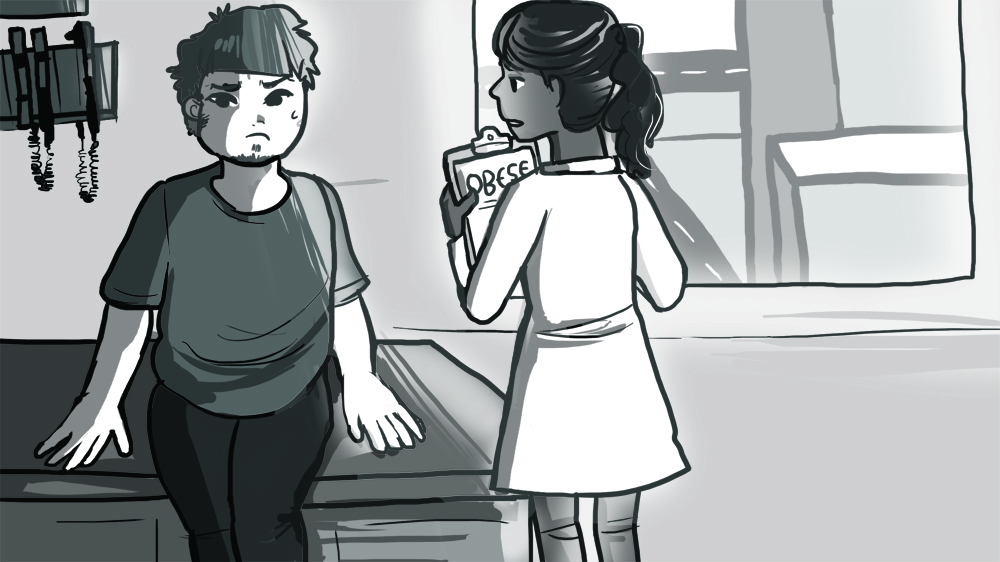Matt Dionne | Sports and Health Editor
Featured illustration courtesy of Jasmine Wiradharma
As someone who identifies as a libertarian, I normally don’t care what people do or say, as long as it doesn’t interfere with my ability to live my life the way I see fit.
If you want to get drunk on a Tuesday, have a drink for me; if you want to spend half your pay cheque on lottery tickets, good luck; if you want to drop out of school to become a DJ, send me a link to your Soundcloud profile—I don’t care.
With that being said, there’s an expression that is becoming popular that I absolutely can’t stand: fat shaming.
Fat shaming is an accusation that a person, through their actions or comments, is judging another person based on their weight, commonly those who are overweight or obese.
The easiest way to determine what is considered obese is to look at body mass index, known as BMI, which is a number that is determined based on a person’s height, weight and age. A BMI of 18.5 or less is considered underweight, a BMI of 18.5 to 25 is considered a healthy weight, a BMI of 25 to 30 is considered overweight and a BMI of 30 or higher is obese.
A simple glance at a person’s belly is not a correct judgement of a person’s health.
Judging a book by its cover, or a body by its weight, is wrong. However, a trend that many notice is that people who accuse others of fat shaming can use it as a way to justify an unhealthy lifestyle. Obviously, people should not be going around commenting on other people’s weight. That’s none of their business.
I understand there are a plethora of factors that can determine a person’s weight: genetics, mental or physical illnesses or even cultural perceptions.
However, those are not the only factors. They’re not even the greatest contributing factor. The two biggest contributing factors are diet and lifestyle, or sedentary versus active.
While having obese parents does increase the risk of obesity, it is largely dependant on your lifestyle. If your parents aren’t leading an active lifestyle or eating properly, then chances are they’ll be overweight. If inactivity and poor dietary habits are the values they instill in you, then the chances are you will also be overweight. It becomes a self-fulfilling prophecy.
As a society, we don’t tolerate enabling when it comes to drugs or alcohol, but for some reason, when it comes to obesity, it is becoming more acceptable.
Defenders against fat shaming will often claim that we should love the body that we’re in, regardless of our pants size. But what if their weight is actually an indication of a more serious problem, and we’re enabling their health risks?
This can cause serious problems at a micro and macro level. On the micro level, it can lead to health concerns. People who are dealing with obesity are more likely to develop Type 2 diabetes, heart disease and high blood pressure, among other problems.
Eleven million Canadians are living with diabetes, and roughly 9.9 million of those people are suffering from Type 2 diabetes. According to the Harvard School of Public Health, nine out of 10 cases of Type 2 diabetes could have been prevented. That means that 8.91 million of those cases could have been avoided.
But it’s not just physical problems; people who are overweight or obese can also develop psychological issues such as depression and low self-esteem.
This is made worse when doctors are accused of fat shaming. If your doctor told you to quit smoking, would you accuse them of being intolerant? Probably not. But if a doctor says a patient needs to lose weight, suddenly they’re fat shaming their patient.
The worst instance of this fat shaming culture I’ve witnessed occurred this summer when plus-size model Ashley Graham posted a picture on Instagram. In the picture, it appears Graham had lost some weight. However, instead of being commended, she was attacked and accused of no longer being a role model for larger women. The people who had been accusing others of body shaming were now doing the body shaming.
Instead of coming up with passive-aggressive accusations and spreading hateful messages online, we should be focusing on educating people about eating healthy and regular exercise. Instead of justifying an unhealthy lifestyle, we should be encouraging a healthy one, regardless of their pants size.




